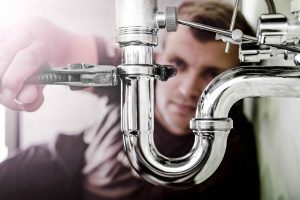 If you’ve been making some upgrades around the house, it’s important to remember your home’s plumbing system. Small leaks or malfunctioning appliances can quickly add to your monthly utility bills. Here are just a few simple plumbing tips that can help keep your household budget in check and prevent future damage to your plumbing system.
If you’ve been making some upgrades around the house, it’s important to remember your home’s plumbing system. Small leaks or malfunctioning appliances can quickly add to your monthly utility bills. Here are just a few simple plumbing tips that can help keep your household budget in check and prevent future damage to your plumbing system.
Replace Outdated Faucets
Is it time to replace an outdated kitchen or bathroom faucet? Your faucets do more than enhance the appearance of your sink. They also adjust the amount of water passing through. Over time, this can cause an increase in your water bill. Newer eco-friendly designs help control how much water is being used and reduce water flow by up to 30 percent or more. Just choose products with the WaterSense label backed by the EPA.
Examine Your Water Meter
Your water meter runs from the outside water main line to a small metered box located on the outside of your home. As it makes its way into your home, another meter controls water flow. Be sure to check this area for leaks. Do you see the meter turning even though water isn’t flowing throughout your home? If so, you may have a water leak somewhere. We can come to your home and perform a complete plumbing inspection, which will detect the source of the leak.
Look for Drips
Puddles of water on your basement floor are an obvious sign of a plumbing leak. But, in many cases, a loose valve or cracked pipe may simply cause condensation to build up in a specific area. Odor-causing bacteria and mold can begin to form in these places. If you suspect a leak, having your plumbing inspected by one of us can help you save money and avoid replacing damaged drywall and carpeting.
Upgrade Your Water Heater
When it comes to plumbing tips, one of the best ways to lower your utility bills is to replace a hot water tank that is over ten years old. Older models can drain your electric and gas bill each month. An on-demand gas water heater can save on your utility bills each year. Because you’re only using water that is being heated right away, there is no need to keep stored water warm. If you decide to keep your old water heater, consider having it drained every six months to flush out impurities and improve its performance.
Inspect Your Toilet
You may take your toilet for granted every day, but it actually works hard to keep your home’s plumbing system flowing properly. A sticky flapper valve can cause more water to push through your toilet than what is needed. Having a professional plumber inspect your toilet for flow issues and valve leaks can improve performance and reduce the risk of future plumbing disasters and overflow. If your toilet is over 10 years old consider replacing it with an eco-friendly one that uses less water.

Recent Comments